Bladder Cancer — Embolization or Chemoembolization: treatment in the Best Hospitals in the World
Treatment prices are regulated by national law of the corresponding countries, but can also include additional hospital coefficients. In order to receive the individual cost calculation, please send us the request and medical records.
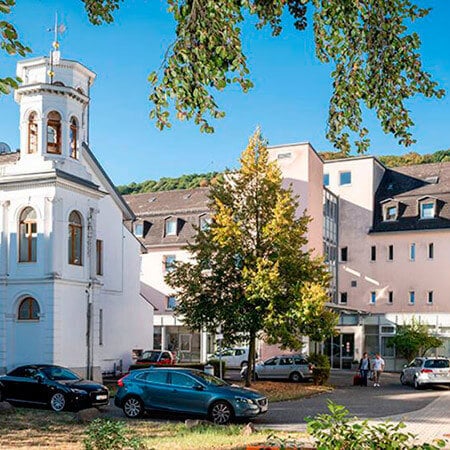
Department of Interventional Radiology
The Department of Interventional Radiology offers the full range of modern diagnostic procedures using ionizing radiation, image-guided tissue sampling (biopsy), and minimally invasive therapeutic procedures. Patients may be seen on an inpatient or outpatient basis. To achieve optimal results, the department works closely with specialists in radiation therapy, oncology, neurology, neurosurgery and neuro-oncology, as well as urology, orthopedics, pain management, and palliative care. This collaboration helps ensure an accurate diagnosis and the most effective treatment.
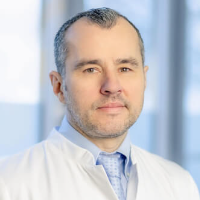


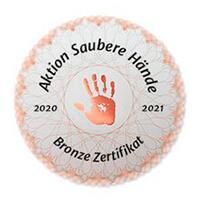

Department of Adult and Pediatric Urology, Andrology
The Department of Adult and Pediatric Urology, Andrology offers the full range of services in the areas of its specialization. Men and boys with diseases of the reproductive system can be diagnosed and treated in the medical facility. Doctors also treat infertility and erectile dysfunction. Medical care is provided to men and women with diseases of the urinary system, namely kidneys, ureters, bladder, and urethra. The department is certified as the Prostate Cancer Center by the German Cancer Society (DKG), which indicates the excellent quality of the services provided in this area. The department's urologists have a perfect command of the innovative treatment methods, including holmium laser enucleation of the prostate (HoLEP), photodynamic therapy, and da Vinci robot-assisted surgery. The department employs comprehensively trained and experienced doctors who apply advanced medical achievements in their practice. Each patient is provided with an individual approach, considering their specific needs and wishes.
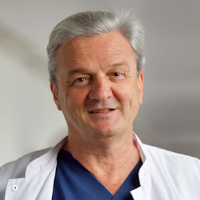






Department of Adult and Pediatric Urology
The Department of Adult and Pediatric Urology provides high-precision diagnostic examinations and effective treatment for diseases of the genitourinary system and reproductive system in men and boys. Of particular interest is drug therapy and surgical treatment of prostate, bladder, kidney, testicular, and penile cancers. The department is part of the Comprehensive Cancer Center Ulm (CCCU). For the patient, this means that their clinical case is studied by a multidisciplinary tumor board, which determines the optimal treatment tactics. The department is also certified by the German Cancer Society (DKG), so all therapeutic procedures meet strict national and international standards. The department's team of urologists also has unique clinical experience in the minimally invasive treatment of kidney stone disease, benign prostatic hyperplasia, neuro-urological dysfunction, and all urologic diseases in children. During the surgical treatment, the specialists at the medical facility successfully use minimally traumatic surgical techniques. They perform endoscopic, laser, minimally invasive, and robot-assisted surgery using the innovative Da Vinci system. The department treats about 3,000 inpatients and 9,000 outpatients with clinical cases of varying complexity annually. The number of surgical procedures performed and treatment outcomes are regularly published by the authorized commission of the Initiative Quality in Medicine (IQM).
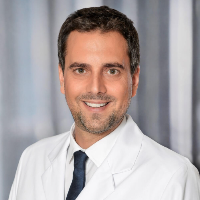





Bladder cancer is a severe oncological disease that often recurs after treatment. It is usually detected at an early stage, when organ-preserving treatment is possible. Nonetheless, 50% of patients sooner or later have a relapse. In 15% of patients, pathology is detected only after the development of metastases.
In the advanced stages of the disease, doctors perform more radical operations: they remove the entire bladder, lymph nodes, and surrounding tissue. However, it is not always possible to perform a surgical intervention. Sometimes patients are weakened by the disease, and in some cases the tumor grows large and becomes inoperable. In such situations, doctors resort to other treatment options, including embolization and chemoembolization of the pelvic arteries.
Content
- What are embolization and chemoembolization
- Who can be candidates for embolization
- How is the procedure performed
- Embolization results
- Why it is worth undergoing chemoembolization abroad
- Treatment in Europe with Booking Health at an affordable price
What are embolization and chemoembolization
Embolization is a treatment option in oncology that involves block of the arteries feeding the tumor. They are closed with emboli. As a result, cancer cells do not receive oxygen and die quickly.
A more advanced version of this procedure is called transcatheter chemoembolization (TACE). In this case, the treatment of patients with bladder cancer involves an additional effect on the tumor with the help of chemotherapy.
The dual mechanism of action on cancer cells ensures quick results. After the procedure, bleeding stops immediately. The neoplasm is rapidly decreasing in size. In some cases, cancer treatment with TACE can bring the tumor into a resectable state.
Who can be candidates for embolization
The mainstay of treatment for bladder cancer is surgery. Doctors perform organ-preserving surgery: transurethral resection. They remove tumors endoscopically and then conduct intravesical chemotherapy or immunotherapy.
With muscle invasive cancer, the bladder must be removed. This operation is called a cystectomy. In the advanced stages, other methods of treatment are used. These may be chemotherapy, immunotherapy, etc. Radiation can rarely be used. For TACE, lipiodol fat emulsion with chemotherapy drugs or drug-eluting microspheres is used. They not only clog the blood vessels, depriving the tumor of the blood supply, but also damage the cancer cells with cytostatics for several weeks.
Embolization is not the most common method for the treatment of bladder cancer. This is an advanced procedure that is technically complex. It is used by a small number of hospitals.
The technique is primarily suitable for patients with inoperable bladder cancer. The procedure is carried out for advanced disease, tumor recurrence, weakened condition of the patient, severe hematuria (excretion of blood in the urine). It shrinks swelling and stops bleeding.
How is the procedure performed
An X-ray-guided intervention is minimally invasive. It is performed through transfemoral access. The doctor makes a small incision in the leg to insert a catheter into the femoral artery. The catheter is then advanced into other smaller vessels that feed the bladder.
A differentiated selection of the sizes of microcatheters and microspheres that can withstand short-term compression allows them to be introduced specifically into the vessels carrying blood to the tumor. However, transcatheter arterial embolization for pelvic tumors is a complex and often lengthy procedure. It can last up to 3 hours. With malignant pelvic tumors, the arterial blood flow is very branched, the arteries are always convoluted, often of small diameter, which leads to great technical difficulties in catheter insertion.
Despite all the difficulties, the procedure is being carried out successfully in Europe. The doctors usually manage to close the vessels feeding the tumor, avoiding serious complications.
After arterial catheterization, angiography is performed. Doctors inject a contrast agent to assess the blood supply to the bladder and the tumor. Then an embolysate is injected, which closes the lumen of the vessels. As a rule, the internal iliac artery is subject to embolization, less often the upper cystic artery and other vessels.
The doctors in Europe prefer superselective arterial embolization for bladder cancer. This means that they do not close the entire artery completely, but its small branches, located as close as possible to the tumor. This approach makes the procedure safer for the patient. Cancer cells die due to a lack of blood supply, while healthy tissue is almost not damaged.
TACE is preferred over pure embolization, as in this case an additional therapeutic effect is provided by cytostatics. In Europe, microspheres eluting chemotherapy drugs are commonly used. For pelvic neoplasms, they provide three times higher response rate to treatment than the use of oily chemoembolization.
Embolization results
When treating advanced bladder cancer using chemoembolization, the following goals can be achieved:
- Tumor becomes resectable. If earlier its removal was considered impossible, then after reducing the size of the neoplasm, the doctor can perform a radical operation, trying to cure cancer.
- Control over bleeding. In the advanced stages of bladder cancer, patients suffer from bleeding, including massive, life-threatening ones. After embolization, bleeding stops. This procedure is more effective and more selective than arterial ligation. It allows avoiding surgery, after which the patient needs to recover for a long time. In 80% of patients, the absence of bleeding persists for more than 4 months. If it recurs, embolization can be repeated.
- Tumor size reduction. Its reduction entails an improvement in the patient's condition, an increase in life expectancy, and the creation of conditions for the use of other treatment methods. The pressure of the neoplasm on neighboring organs decreases, so the risk of cancer complications decreases.
Why it is worth undergoing chemoembolization abroad
The TACE method has been used in oncology for decades, but it is usually used to treat primary or metastatic liver neoplasms. TACE is a relatively new method for the treatment of bladder cancer. This is a technically complex procedure, and only a few hospitals can perform it.
We will select for you a medical center in Europe, whose doctors have extensive experience in using TACE for bladder cancer. Therefore, the procedure will be safe for health, with the best therapeutic result.
There are several reasons for you to undergo the TACE procedure abroad:
- High-precision diagnostics. It allows doctors to perfectly assess the blood supply to the bladder tumor in order to perform TACE with the best outcome.
- Adequate pain relief. You will not have any discomfort during the procedure. Adequate anesthetic management is very important as the operation can take 2-3 hours.
- Mostly drug-eluting microspheres are used instead of oily TACE. Arterial chemoembolization with microspheres is 3 times more effective.
- Superselective TACE performance. It is safer for health, since the embolysate is injected into small-caliber arteries located as close to the tumor as possible.
- Doctors use coils or a balloon catheter to protect non-target vessels from emboli penetration to reduce the risk of complications.
- Arterial embolization for the treatment of bladder cancer can be successfully combined with other methods: surgery, chemotherapy, immunotherapy.
Treatment in Europe with Booking Health at an affordable price
To undergo treatment in one of the European hospitals, please use the services of the Booking Health company. On our website, you can see the cost of treatment in different hospitals, compare prices and book a medical care program at a favorable price. The cost of embolization or chemoembolization for bladder cancer is between 24,300 EUR and 41,400 EUR. Transarterial chemoembolization (TACE) in European hospitals will be easier and faster for you, and the cost of treatment will be lower.
Please leave your request on our website. Our employee will contact you and advise you about treatment in Europe. The Booking Health company will take care of the organization of your trip. We will provide the following benefits for you:
- We will choose a hospital for treatment in Europe, whose doctors specialize in the treatment of bladder cancer and show the best results.
- We will help you overcome the language barrier, establish communication with your attending physician.
- We will reduce the waiting time for the start of the medical care program and book a doctor's appointment on the most suitable dates.
- We will reduce the price. The cost of treatment in European hospitals will be lower due to the lack of additional coefficients for foreign patients.
- We will take care of all organizational issues: documents for entering the country, transfer from the airport, hotel, interpreting services, etc.
- We will prepare a program and translate medical documents. You do not have to repeat the previously performed diagnostic procedures.
- We will provide communication with the hospital after treatment in Europe.
- We will organize additional diagnostic examinations and treatment in European hospitals, if necessary.
- We will buy medicines abroad and forward them to your native country.
- We will help you keep in touch with the hospital and the doctor after treatment in Europe.
You will receive treatment from the best doctors in the world. The Booking Health employees will help reduce the cost of treatment and solve all organizational issues, and you will only have to focus on restoring your health.
Authors: Dr. Nadezhda Ivanisova, Dr. Sergey Pashchenko

